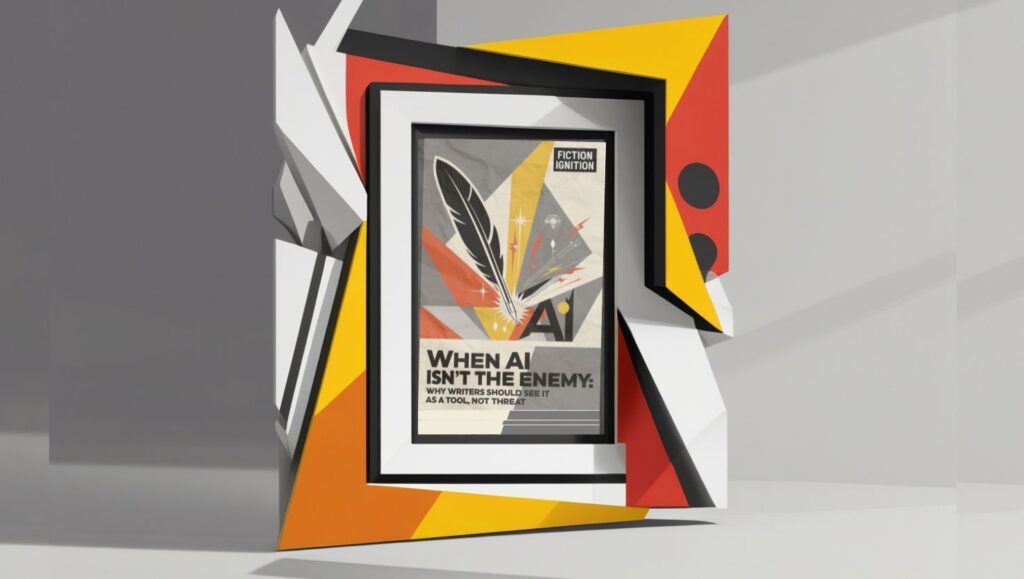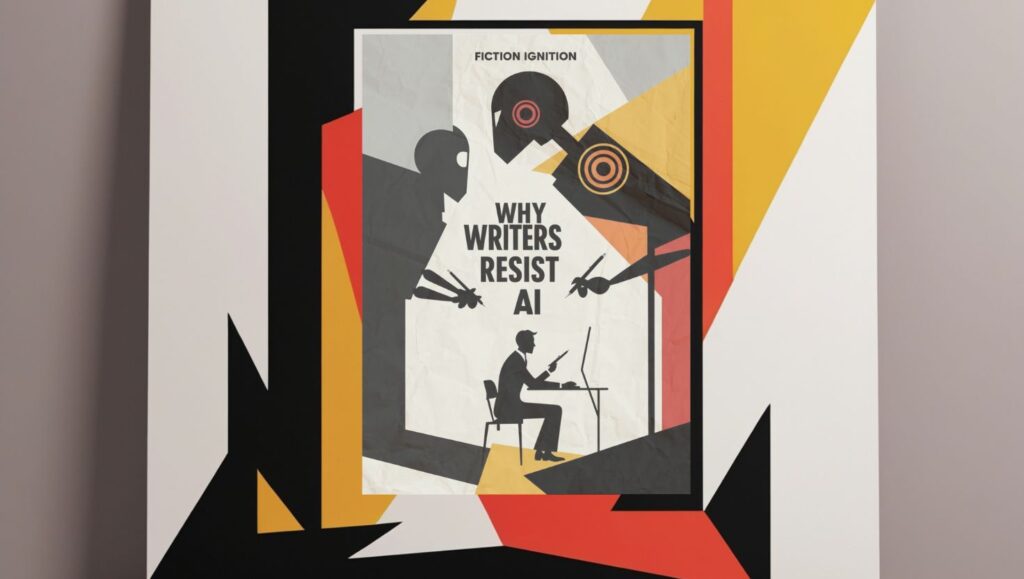Greetings, Fiction Igniters! Have you ever been cornered by that buzzing debate about artificial intelligence—where half the crowd says it’s the dawn of Skynet, and the other half thinks it’s the Holy Grail of human creativity? If you have, you’re in the right place. Today, we’re diving deep into the fiery debate, torching misconceptions, and kindling a new perspective: AI isn’t our adversary, dear writers—it’s our apprentice, our ally, and our creative partner.
Let’s stoke this flame one log at a time.
10. AI Helps You Overcome Writer’s Block Faster Than a Double Espresso
Ever stared at a blank page, feeling like the cursor’s blinking is mocking you? Welcome to the club—even the greats like Hemingway wrestled with writer’s block. But here’s where AI struts in with its cape: tools like ChatGPT, Jasper, or Sudowrite can brainstorm prompts, suggest first lines, or even whip up character bios.
Example: Imagine if George R.R. Martin’s AI assistant nudged him to explore a new subplot for Game of Thrones. That’s not cheating; that’s tagging in a partner to fight the creative battle.
Actionable Tip: Stuck? Ask AI to list 10 opening sentences for your scene. One might ignite the spark you need.
9. Collaborative Writing Is the Future—and AI’s a Pretty Good Writing Buddy
Remember how Lennon and McCartney bounced ideas off each other? Well, AI can be your “Paul” (or your “John,” depending on who you vibe with). Sure, it’s not flesh-and-blood, but it’s a machine that can toss ideas back at you faster than a tennis pro.
Example: Margaret Atwood experimented with AI to explore story ideas—and she’s not exactly an amateur, right?
Actionable Tip: Use AI to outline a chapter or rewrite a scene. It’ll never steal your thunder, only add to it.
8. AI Can Help You Master Genre Tropes Without Falling Into Clichés
Genres have rules—you’d better not skip the murder in a murder mystery or forget the star-crossed lovers in a romance. But how do you keep your story fresh without rehashing old plots? AI can analyze a million stories in seconds to show you how.
Example: Ian McEwan’s Atonement redefined the unreliable narrator. What if AI could suggest a twist that’s both fresh and genre-savvy?
Actionable Tip: Ask AI for unconventional plot twists in your genre. Combine the most outrageous ones with your own ideas.
7. It’s Like Having a Grammar Wizard On Call
Not everyone’s a grammar geek. Some of us are more about vibes than commas. That’s where AI tools like Grammarly or ProWritingAid shine.
Example: Stephen King’s On Writing reminds us that even he needs edits. Imagine what King could’ve done with ProWritingAid cleaning up drafts in minutes instead of weeks.
Actionable Tip: Run your drafts through a grammar tool. You’ll polish your prose without losing your voice.
6. World-Building Just Got a Jetpack
Creating whole worlds from scratch can be exhilarating—and exhausting. Enter AI, stage left. Whether it’s naming a fantasy kingdom or sketching out its culture, AI can handle the grunt work while you weave the magic.
Example: Tolkien spent years crafting Middle-Earth—and we’re glad he did. But hey, imagine if AI could’ve helped him map out that Silmarillion timeline.
Actionable Tip: Use AI to generate maps, histories, or languages for your fictional worlds. Save your energy for the plot.
5. AI Analyzes What Readers Love (Without Selling Your Soul)
Ever wondered why some books go viral and others flop? AI can dissect reader trends faster than you can say “book club.” It’s like market research on steroids—but for art.
Example: J.K. Rowling understood her audience instinctively. With AI, you can understand yours analytically—and instinctively.
Actionable Tip: Feed AI your book idea and ask for marketing tips. You might discover an audience you didn’t even know existed.
4. Speed Up Research Without Losing Depth
Research can feel like quicksand—you dive in for one fact and lose an afternoon. AI tools can sift through mountains of data and hand you what you need.
Example: Think of Mary Shelley piecing together the science for Frankenstein. An AI assistant might’ve cut her research time in half.
Actionable Tip: Use AI to create summaries of topics you need. Then dive into the juicy bits that spark your imagination.
3. Editing? Meet Your New Co-Pilot
No one nails a draft on the first try. (And if they say they do, they’re lying.) AI excels at catching plot holes, pacing issues, and even overused phrases—all the stuff that takes your manuscript from good to glorious.
Example: Imagine if Hemingway’s AI editor pointed out every time he overused “and” in his early drafts. We’d still get that punchy prose, but faster.
Actionable Tip: After editing manually, run your draft through an AI tool. Let it catch what you might have missed.
2. AI Can Inspire—But It Can’t Replace You
Here’s the deal: AI can help, but it’ll never have your unique voice, your perspective, or your passion. It’s a brush; you’re the artist. AI’s the scalpel; you’re the surgeon.
Example: No AI could write The Catcher in the Rye. That was all Salinger’s soul on the page. Your work’s the same.
Actionable Tip: Use AI to sharpen your tools, but always let your heart guide the story.
1. AI Frees You Up to Be More Creative
At its core, AI’s greatest strength is that it takes care of the mundane so you can do what you do best: CREATE.
Example: Think of Ray Bradbury’s relentless creativity in Fahrenheit 451. If AI could handle the busywork, imagine how many more brilliant books he might’ve written.
Actionable Tip: Use AI for the tasks that drain you, and save your energy for the magic only you can make.
The Final Spark
So, Fiction Igniters, let’s rewrite the narrative. AI isn’t the enemy of creativity—it’s the ally we didn’t know we needed. It’s time to wield this new tool with all the brilliance and boldness we’re capable of. After all, the pen (or keyboard) is still mightier than the algorithm.
Until next time, don’t write—ignite!


